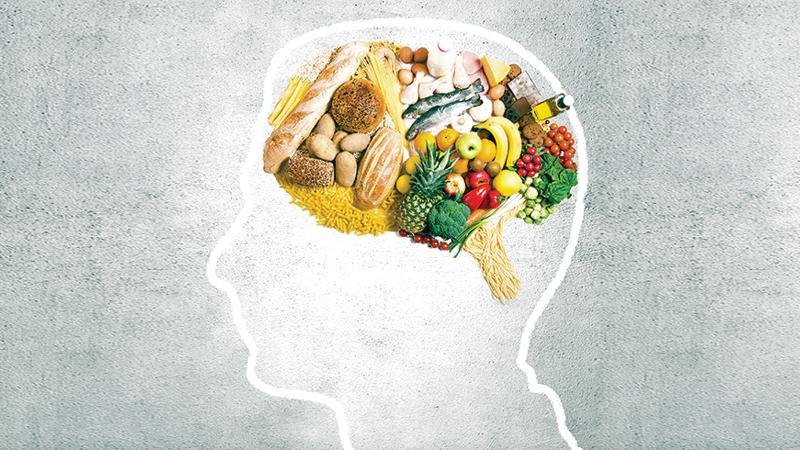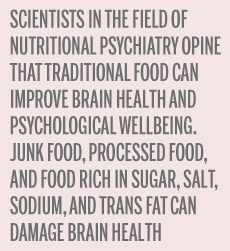

Food does not contribute only to physical wellbeing. The link between good food and the proper functioning of the brain cannot be disregarded. For many centuries, the connection between food and physical health has been extensively researched, studied, and established. However, the emerging field of nutritional psychiatry explores how food can affect the psychological wellbeing of people. A growing body of researchhas found that the food that we eat has a significant impact on our brain health. Scientists have found that certain food can negatively impact the brain while others can improve its health.
Brain and gut
There is a strong link between the brain and the gastrointestinal tract. Studies have found that gut health affects the functioning of the brain. The gut microbiome plays a vital role in the psychological wellbeing of a person.
The link between the brain and gut is established by the enteric nervous system. This regulates the physiological functions of the gastrointestinal tract and communication between the gut and the brain. Research have found that disturbance to the proper functioning of this system can lead to psychiatric issues such as anxiety and depression.
It is a two- way communication from brain to gut and the gut to brain. This connection can be practically experienced in our day-to-day life when we are compelled to encounter a tensed or traumatic situation. The stomach often gets upset and most people experience loose motion when they are emotionally and psychologically affected. ‘Butterflies in the stomach’ is a similar scenario that is experienced by a person who is undergoing spasms of extreme emotions.
Happy hormone
Serotonin is the major hormone responsible for improving mood and making a person happy.A high level of this neurotransmitter is associated with euphoria and exhilaration while the vice is responsible for anxiety, depression, and stress etc. A good mood is a sign of being psychologically healthy which in turn assures physical health.
Serotonin is produced in the brain as well as in the gut. About 95 percent of serotonin is produced in the gut. This shows that, the human alimentary canal does not only helpwith digestion and physical wellbeing alone but also contributes to psychological health.
The production of serotonin in the gut is influenced by the gut microbiome. The friendly bacteria in the human gastrointestinal tract help a person stay healthy physically and psychologically. The gut microbiome helps reduce inflammation and increases nutrient absorption. It is these good bacteria in the gut that activate the neural pathways connecting the brain and the gut.
Probiotics
 Probiotic-rich food increases the number of healthy gut microbiota. Probiotics are the live friendly bacteria and yeasts that yield immense health benefits to the host. Probiotics help restore the balance of the microbiome in the gut. Generally, any fermented food is rich in probiotics. The most common source of probiotics is naturally fermented food such as curd and yoghurt.
Probiotic-rich food increases the number of healthy gut microbiota. Probiotics are the live friendly bacteria and yeasts that yield immense health benefits to the host. Probiotics help restore the balance of the microbiome in the gut. Generally, any fermented food is rich in probiotics. The most common source of probiotics is naturally fermented food such as curd and yoghurt.
The traditional Japanese diet consists of a vast array of fermented foods such as Natto (bean curd), Miso (soybean and barley paste), Shoyu (soy sauce) etc. which is also believed to be the secret of the health and longevity of traditional Japanese people.
Fermentation is not an alien concept to Sri Lankans. Fermented foods have been a part of the traditional diet of the people of this country for centuries. Domestic livestock was an essential part of the livelihood of traditional Sri Lankans. Cows and water buffalos were reared for agriculture as well as for obtaining dairy produce for household consumption.
Curd (Mee Kiri/ Thayir) was one of the most loved traditional Sri Lankan desserts rich in probiotics. In the traditional way of making curd, a day-old curd is added to the milk as a culture. Thus, buffalo milk isconverted to curd with the activation of Lactobacillusspecies. These bacteria produce lactic acid and are a good source of probiotics.
Buttermilk (Moru) is prepared by adding salt, water, ginger, green chili, curry leaves and sometimes coriander leaves to the leftover liquid of butter making. Apart from being a good source of probiotics, Moru has other health benefits such as enhancing immunity and cooling down the body.
Diyabath(fermented rice soup) is an indigenous healthy food of Sri Lankans which is rich in probiotics apart from other nutrients. Diyabath has been a part of the traditional Sri Lankan diet which provided essential nutrients and calories. Diyabathis recommended by Sri Lankan ethnomedical practitioners for patients suffering from gastritis to be consumed regularly. Diyabath is also a frugal meal prepared by fermenting the leftover rice of the previous night. This fermented rice soup is generally consumed in the morning and is believed to provide the energy required for hardworking people.
Diyabath should be allowed to be fermented in a clay pot for optimum results. Traditionally, Sri Lankans cook meals in earthenware utensils,and the leftover rice is fermented in the same pot in which the rice was cooked.
In making Diyabath, water is added to the leftover rice and kept aside overnight for fermentation(Lactic acid bacteria cause the fermentation and produce lactic acid) In the following morning, coconut milk, chopped spring onions, salt, and powdered pepper are added. In the traditional way of making Diyabath, pepper was added instead of green chili and pepper yields more health benefits.
South Indian Pazhan Kanjiis a similar dish in which curd is added in place of coconut milk.
Hoppers (Appa/ Appam) are another probiotic-rich food of Sri Lankans. Ground rice is allowed to ferment overnight along with local toddy or coconut water.
VanduAppa which is known in some regions as Pusnambutoo is made of fermented batter of rice flour.
Locally produced toddy (Pol Ra/ Kitul Ra/ Thal Ra) which is made of flower sap of coconut,jaggery palm or palmyrah palm tree is a probiotic-rich alcoholic drink.
Foods of Indian origin such as Idly and Dosatoo contain probiotics. When making Idly and Dosa, a batter of the ground rice flour and Ulunduflour (black gram) is fermented overnight.
Paneer (cottage cheese) and some homemade cheese varieties are also rich in probiotics.
Traditional food
Scientists in the field of nutritional psychiatry opine that traditional food can improve brain health and psychological wellbeing. Junk food, processed food, and food rich in sugar, salt, sodium, and trans fat can damage brain health. They can also affect mental wellbeing and can also lead to psychological issues.
The Traditional Sri Lankan diet consistsmore of vegetables, fruits, whole grains, and nuts along with a modest amount of fish (both sea and inland fish), egg, dairy, and lean meat. They contain natural probiotics and promote mental health.
Recent studies in the field of nutritional psychiatry have found out that people who have adopted traditional diets are happier and more content and are at low risk of getting psychological illnesses such as anxiety, depression, and stress.
